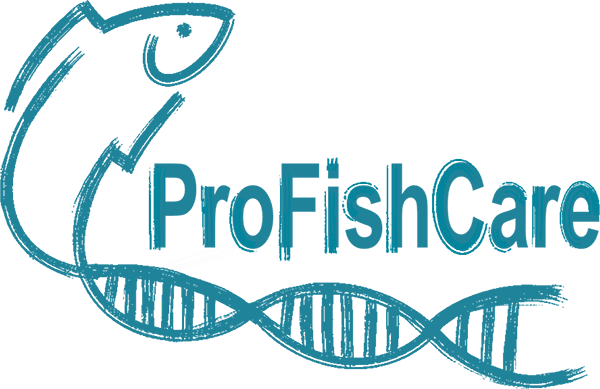Measurable Fish Welfare Assessment –
The Future of Sustainable Aquaculture and Farmed Fish
The Problem: A Growing Aquaculture Industry Without Reliable Welfare Monitoring
Rapid Global Growth of Aquaculture
Globally, aquaculture now produces more than 100 million tons of fish every year (OECD/FAO 2021) — surpassing what capture fisheries can provide from the oceans. Today, 68% of fish in global markets come from fish farming (Nogueira et al., 2020). The sector is expanding rapidly, growing at 5.8% annually — faster than any other food production system (FAO, 2018).
While this growth helps meet global food demand, it also brings pressing challenges.
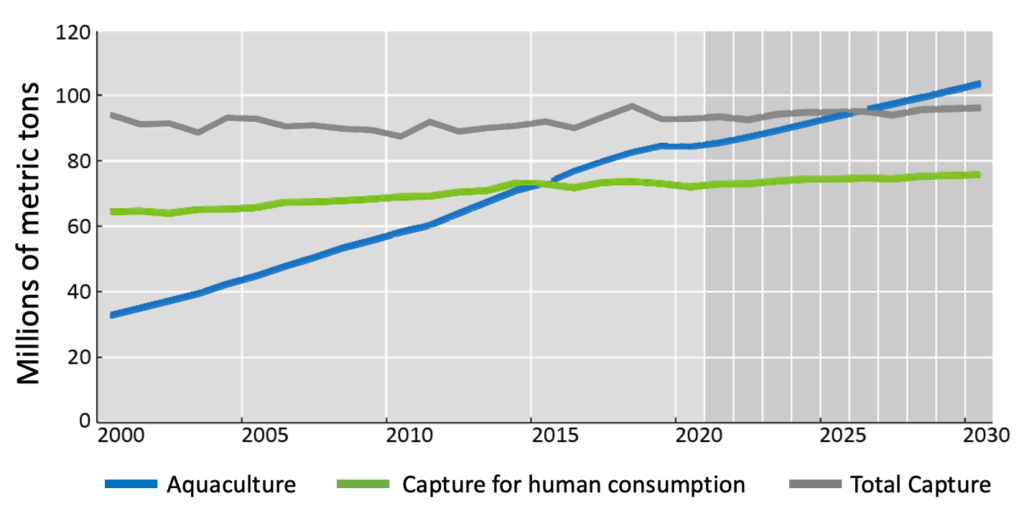
Global aquaculture produces over 100 million tons of fish annually. Source: OECD/FAO 2021.
Growing Challenges of the Aquaculture Sector
While aquaculture is expanding rapidly and already supplies the majority of fish consumed worldwide, this growth comes with significant challenges that affect efficiency, sustainability, and animal welfare.
General Challenges in Aquaculture
- Fish health and welfare issues: Intensive production systems often expose fish to stress — the earliest sign of welfare decline — as well as disease and suboptimal living conditions.
- Species-specific needs: Different fish species have unique biological and welfare requirements, making “one-size-fits-all” approaches ineffective.
- Lack of objective monitoring tools: Until now, fish welfare — especially stress levels that develop long before disease — has been difficult to measure systematically, leaving farms without reliable data for decision-making.
- Ethical responsibility: As awareness grows, consumers demand transparency and humane practices. Fish are sentient and social animals capable of suffering, yet in intensive aquaculture, crowding, disease risk, and artificial environments often restrict natural behaviors and increase stress.
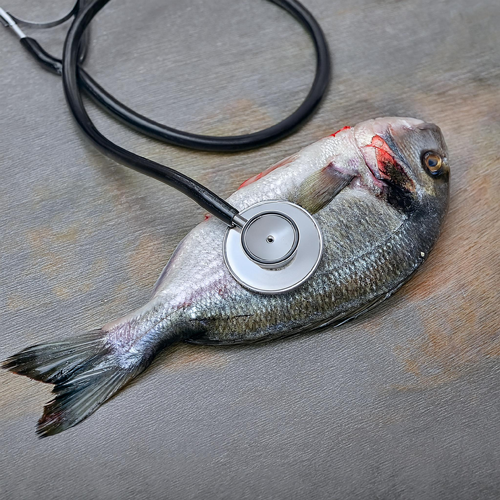
Challenges Linked to Rapid Growth of Aquaculture Sector
- High feed costs: Protein-rich aquafeeds account for around 50% of production costs (Marijani et al., 2019). Crucially, fish welfare directly impacts feed utilization — stressed or unhealthy fish convert feed less efficiently, leading to higher costs and reduced profitability (Saha et al., 2022).
- High mortality rates, with up to 50% of salmon never reaching the market (Munro, L.A. 2020).
- Environmental and sustainability concerns: Dependence on fishmeal and fish oil, as well as waste and resource use, raise long-term sustainability issues (Tacon and Metian, 2008; Boyd, 2015).
Impact of Fish Health on Feed Costs
Feed costs are important for profitability
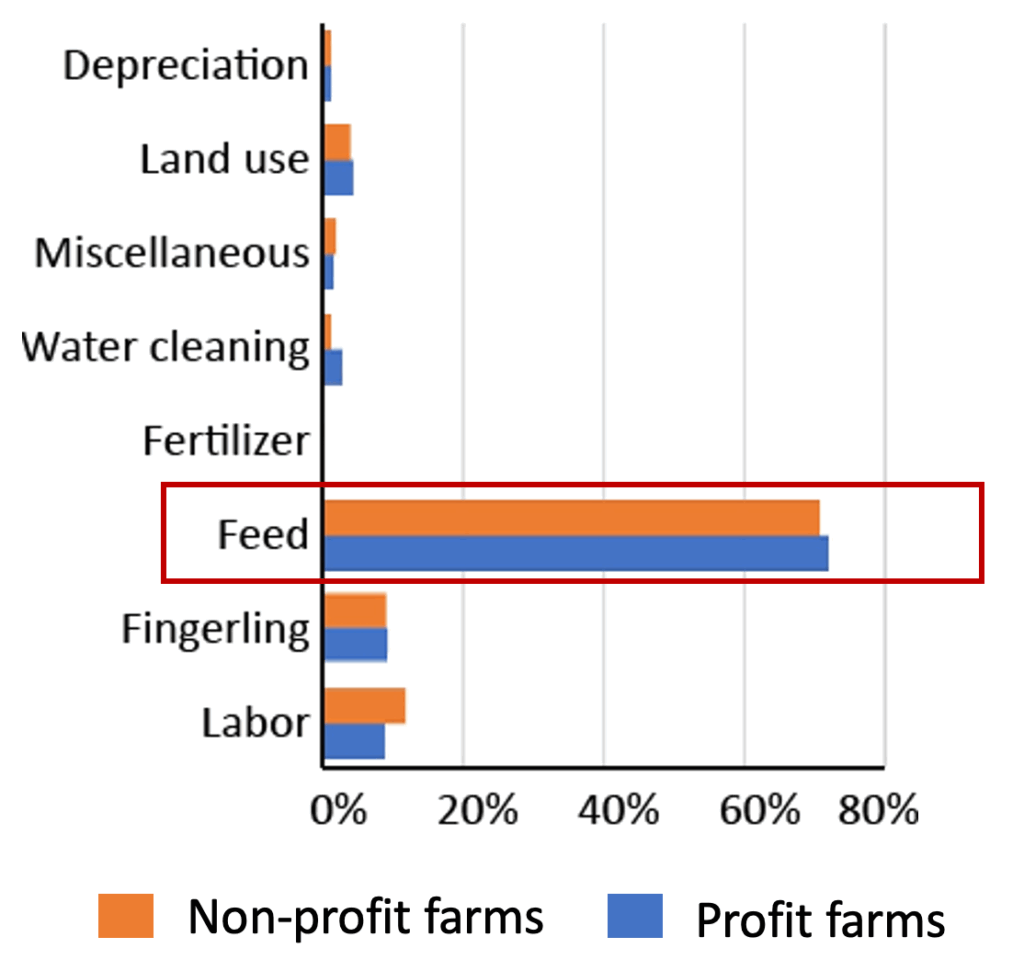
Fish Farming Costs (Pangasius Farms). Since feed accounts for more than half of production costs, efficient welfare management is essential for profit.
Source: Adapted from Saha et al., 2022
Efficient feed use depends on fish health!
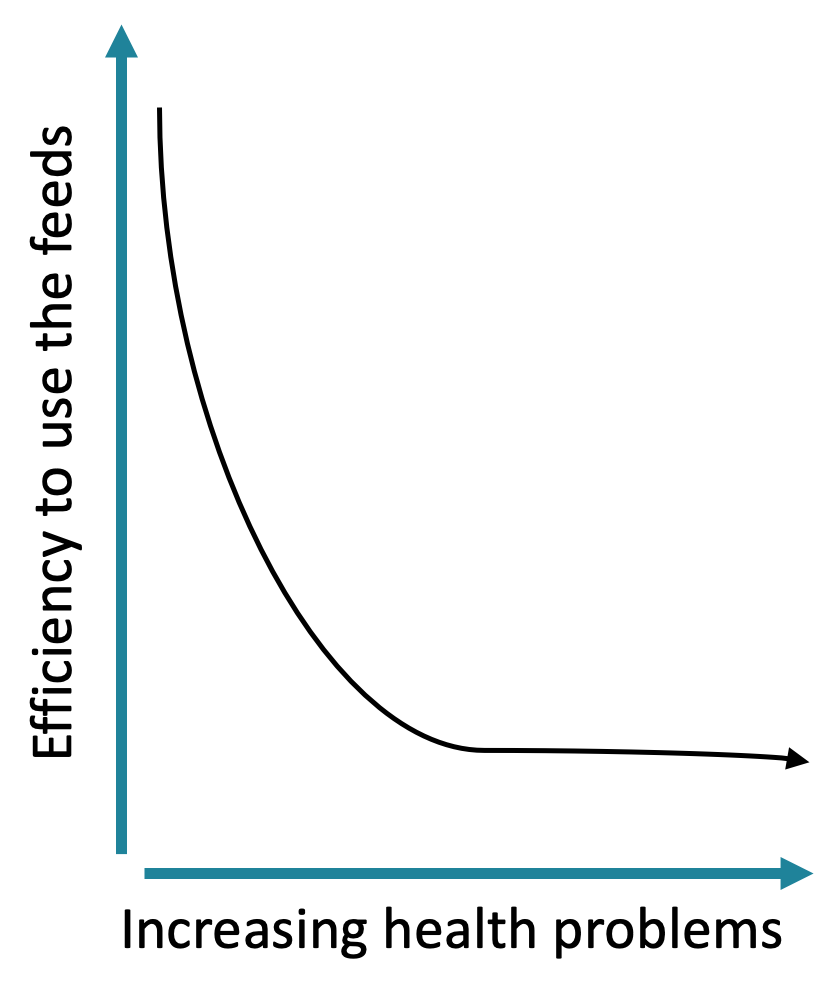
Low Fish Welfare Reduces Feed Utilization Efficiency. Health problems lower feed efficiency, linking welfare directly to production costs.
Source: Adapted from Saha et al., 2022
Total annual feed loss and feed costs resulting from mortality (Scottish Salmon)
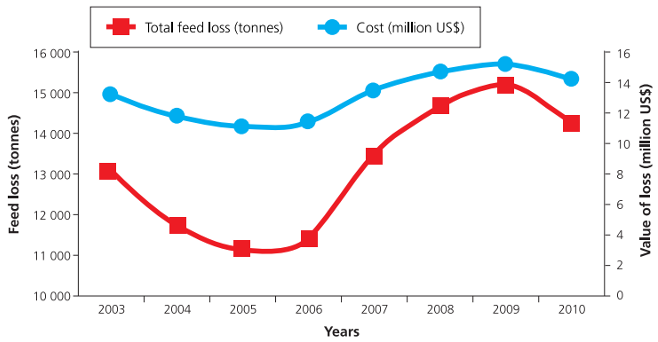
Feed losses cause enormous extra costs.
Source: Adapted from www.seeradonline.gov.uk.
Impact of Mortalities on Profitability of Aquaculture
Mortality is one of the largest hidden costs in aquaculture. Less than 80% of fish reach food production, with losses occurring throughout the lifecycle. In Scotland, 14.6–26.7% of Atlantic salmon smolts died annually after transfer to sea between 2012 and 2017 (Munro, L.A. 2020). Additional losses of around 10% from egg to fry and another 10% from fry to smolt have been reported (Wall, A.E., 1999).
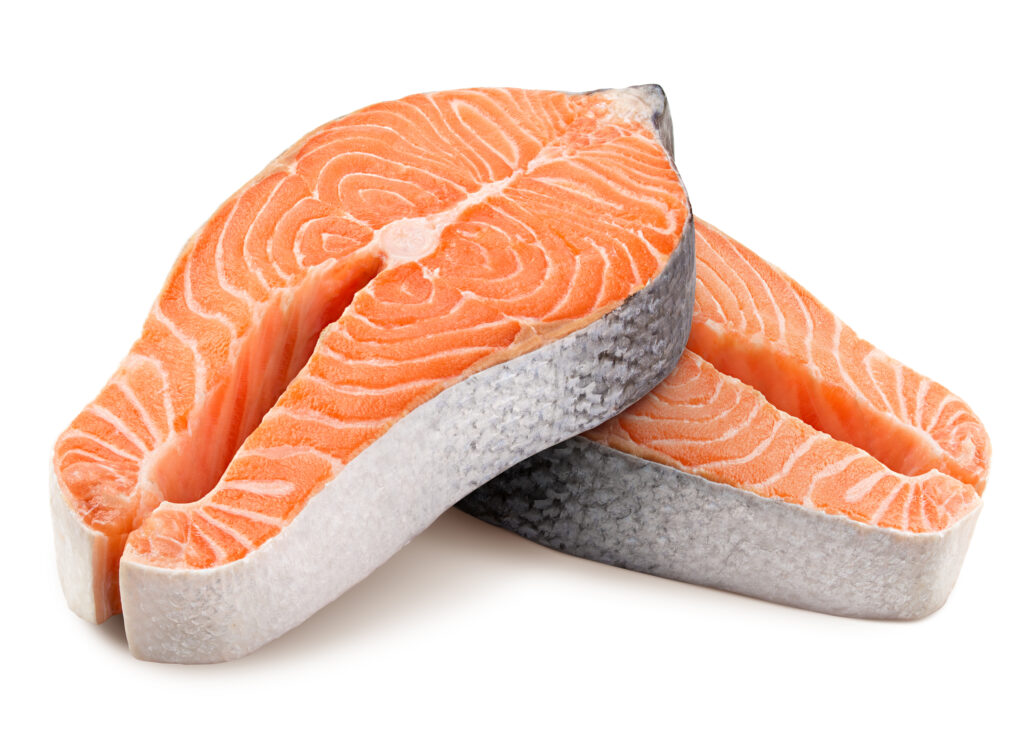
As a result:
Nearly half of salmon never reach the market, reducing profitability and increasing resource waste.
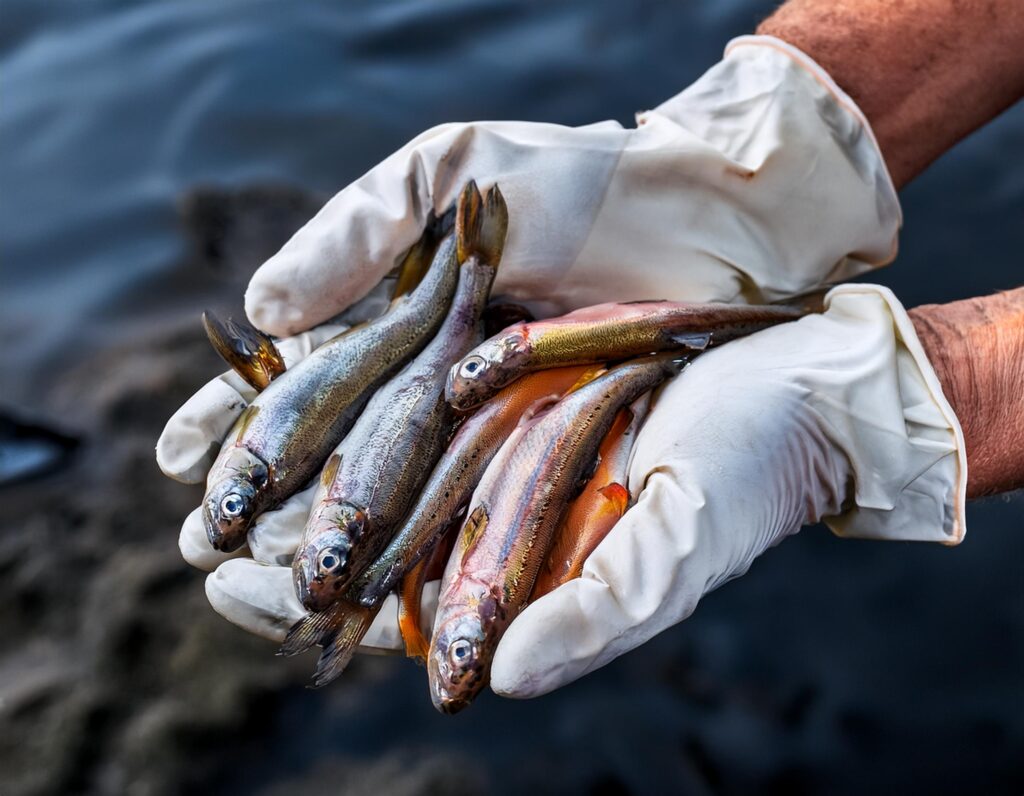
The Solution: Objective and Tailored Fish Welfare Assessment
ProFishCare is revolutionizing aquaculture by making fish welfare — and especially stress, the key early indicator of health issues — measurable, objective, and actionable through user-friendly, species-specific assessment tools tailored to the unique needs of each farm and fish species.
ProFishCare System Integrates:
- AI-powered analysis of biological and environmental data.
- MicroRNA-based stress markers for early detection of welfare issues — measuring stress before visible disease appears.
- Tailored protocols optimized for each farm and fish species.
- Custom SOPs, expert consulting, and regular audits to ensure lasting improvements.
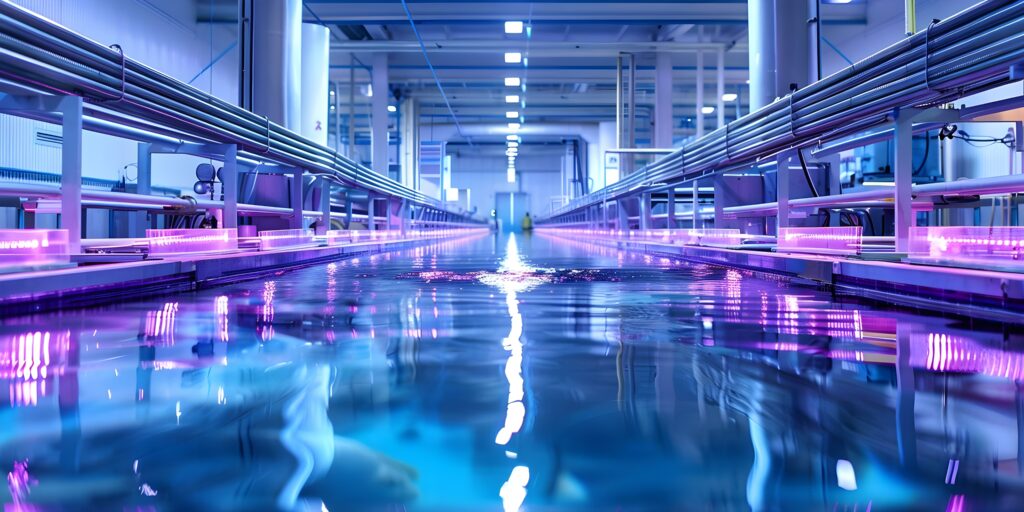
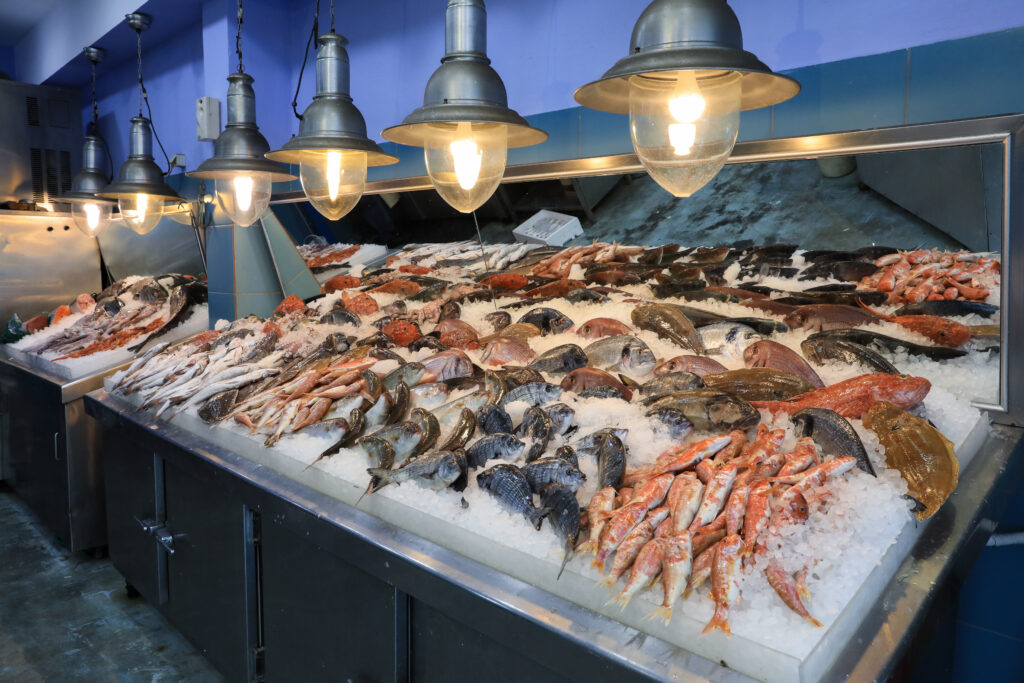
By making fish welfare measurable, ProFishCare helps aquaculture businesses:
- Improve feed efficiency and reduce waste.
- Improve the wellbeing of your fish and increase productivity.
- Promote ethical and transparent farming practices.
- Build consumer trust through sustainability and animal welfare.
The Result: Sustainable Aquaculture Built on Welfare
A holistic approach to fish welfare considers physical health, mental well-being, and natural behaviors. By integrating these principles, aquaculture can evolve into a more sustainable, ethical, and profitable industry.
ProFishCare’s customized solutions are essential to this transition. With objective measurement and tailored recommendations, fish farmers can not only optimize their production but also ensure the welfare of the billions of fish raised each year.
The result: Stronger profitability, improved sustainability, and greater consumer trust — all while protecting the welfare of fish as sentient beings.
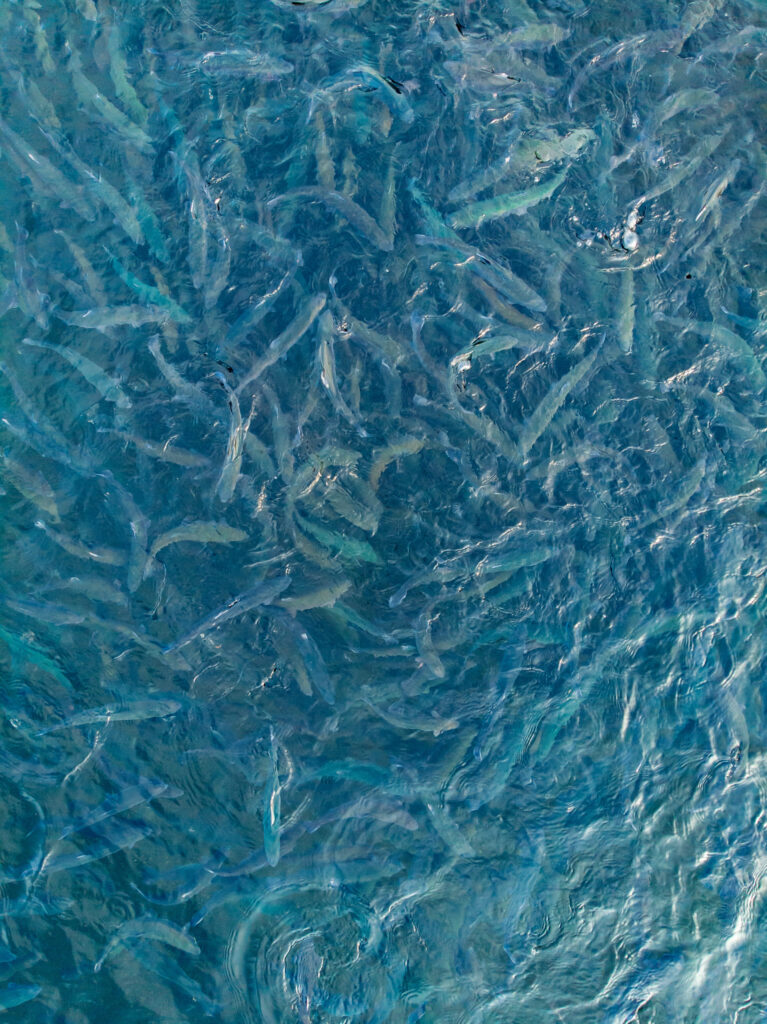
9 Reasons for Objective Fish Welfare Monitoring
Prioritizing fish welfare is essential for ethical, environmental, and economic reasons, and it plays a vital role in ensuring the sustainability and integrity of aquaculture practices.
Enhanced Fish Health and Wellbeing
Tailored assessments ensure that the unique needs and stressors of each fish species and aquaculture facility are accurately identified and addressed. This personalized approach leads to healthier, more resilient fish enhancing overall wellbeing.
Ethical Responsibility and Humane Treatment
Objective welfare assessments ensure that farmed fish are treated with the highest standards of care and compassion. By recognizing and mitigating sources of stress and discomfort, ProFishCare’s assessments promote humane and ethical treatment, aligning with societal expectations and ethical obligations.
Increased Productivity and Efficiency
Healthy, well-cared-for fish are more productive, leading to improved growth rates, better feed conversion, and higher quality yields. Objective assessments enable farmers to optimize conditions, resulting in more efficient and profitable aquaculture operations.
Environmental Sustainability
Objective welfare assessments help minimize the environmental impact of aquaculture. By promoting optimal living conditions and reducing stress-related health issues, these assessments contribute to sustainable practices that preserve aquatic ecosystems, reduce pollution, and support biodiversity.
Risk Management and Disease Prevention
ProFishCare’s assessments provide early detection of fish stress and potential health issues, allowing for timely interventions. This proactive approach helps prevent disease outbreaks and reduces the need for antibiotics and other treatments, promoting a healthier and more sustainable farming environment.
Transparency and Consumer Trust
Objective and reliable welfare assessments enhance transparency in aquaculture practices. By demonstrating a commitment to high welfare standards, aquaculture businesses can build trust with consumers, stakeholders, and regulatory bodies.
Compliance with Regulatory Standards
Tailored welfare assessments help aquaculture facilities comply with evolving regulatory requirements and industry standards. By staying ahead of compliance needs, businesses can avoid potential legal issues and ensure their operations meet the highest standards of animal welfare.
Long-term Economic Viability
Investing in fish welfare through tailored assessments supports the long-term economic viability of aquaculture operations. Healthier fish, improved productivity, and sustainable practices lead to cost savings, higher profits, and a stronger market position.
Global Food Security
ProFishCare’s approach contributes to global food security by promoting efficient and sustainable aquaculture practices. By improving the welfare and productivity of farmed fish, we help ensure a stable and reliable supply of high-quality seafood to meet the growing global demand.
